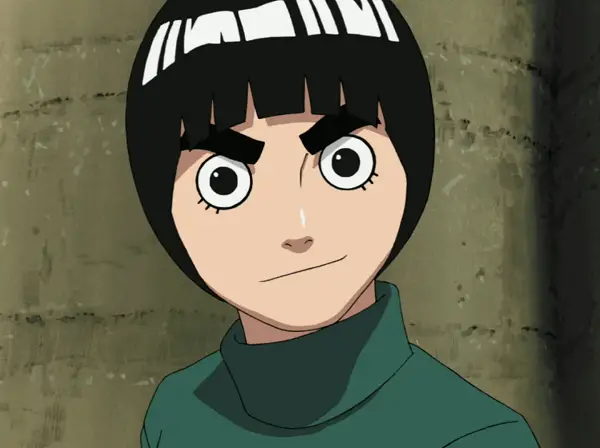Myers-Briggs Types in Naruto: Rock Lee (ESFJ)

Naruto Shippuden is a classic anime series with a wealth of identifiable Myers-Briggs personality types (often referred to as MBTI). Rock Lee is a fairly straight forward example of the ESFJ personality type. Continue reading to find out why!
The Myers-Briggs Personality Type of Rock Lee
Dominant Fe:
“Who decided to forge bonds of comradeship in a mighty meeting of fists and forgot to invite Rock Lee?!”
Rock Lee from the Naruto series demonstrates the typical characteristics of a healthy Fe dominant personality. Lee is very bold about proclaiming his goals and intentions to others, suggesting that he’s an extravert. He’s empathetic, passionate, encouraging, polite, respectful, value-driven, and somewhat formal. Lee is shown frequently getting caught up in the heat of the moment, in an emotional sense. His passionate nature is obvious, he is very emotionally demonstrative, oftentimes being shown crying and proclaiming values like camaraderie and friendship. At one point, he breaks down into tears and begs Guy Sensei for forgiveness over something as small as forgetting about a dinner that Guy had taken him to recently. Lee is also shown feeling bad for Naruto on numerous occasions, and even drawing people together into a group activity (the bathhouse) for the sake of Naruto’s loneliness. He also prefers to give people the benefit of the doubt, sometimes viewing others in a somewhat naive fashion. In addition, Lee is quick to use his secret technique at the risk of his own life when others are in danger. Lastly, Lee mimics Guy Sensei completely in both dress and speech. His overall focus seems to be on pleasing others like Guy and proving his worth to the world, rather than asserting his own identity. He is quick to look to Guy for guidance and to be told what to do, like in the case of the surgery, rather than just coming to his own decision.
Auxiliary Si:
“Naruto, I get where you are coming from, believe me. But, the rules say all fighting must be done officially in a match. The loser beating the gifted genius through sheer willpower. Now, would not that make for an exciting match?”
Rock Lee is very literal and straightforward. He’s prone to taking metaphors at face value. Subtlety is not his specialty. He hates sneaking around, and being anything less than upfront. An opponent once comments that Lee’s fighting style is very direct. Lee is also very hardworking and disciplined, which some might attribute to Te, but in Lee’s case, it’s the consistent work regimen that points to Si. Lee has a hard time relaxing, and would rather remain in training for every waking moment, which points away from him being a perceiver. Building his own dojo piece by piece is a good example of an Si user’s meticulous nature. Lee is also very rule focused, preferring to follow every rule to the letter. This tendency is demonstrated on multiple occasions, like his disapproval over people playing hookie, and spouting the rules concerning underage drinking while in the midst of combat. He is also shown rebuking Naruto at one point, and urging him to obey the rules (while simultaneously empathizing with him: Fe-Si). Lastly, Lee carries around a small book which he uses to record advice given to him by Guy, which is suggestive of an Si user.
Tertiary Ne:
Lee’s tertiary Ne is partially demonstrated through his enthusiastic and consistently upbeat demeanor, due to the combination of healthy Fe-Ne. He gets incredibly excited whenever Guy mentions teaching him a new technique. In addition, Lee latches onto the flowery, metaphorical speech of his sensei and learns to speak in this dramatic way himself. Lee also has a tendency to ask a lot of questions and absorb every piece of information shared with him, which is typical of those falling within Si/Ne axis. His Ne also helps him to produce or latch onto wild ideas like building his own dojo so he can face even greater challengers to hone his skills.
Inferior Ti:
Lee’s inferior Ti comes out in his hyper self-criticism. Even the slightest failure provokes an emotional reaction from Lee. No matter how small the failure, Lee always beats himself up over it, whether verbally or mentally, and then proceeds to deal out some kind of punishment as penance. As a whole, his inferior Ti is relatively healthy since he is able to rein in his emotions and remain level-headed in most scenarios. However, at times, Lee is over eager to sacrifice himself in situations where a sacrifice is unnecessary (like in the Chunin exam), which points back to his weak Ti.
Hi there! If you enjoyed that article, leave us a quick comment to encourage us to keep writing, and check out our Updates and Current Projects. In addition, if you've found our content helpful, please consider Buying Us A Coffee to help keep this website running. Thank you!

Interesting. Some very different thought processes going on with Lee’s major points of interaction in Part 1 (Neji & Gaara)
Always thought he was underused in Shippuden too, like most of the Chunin Exam participants bar Gaara and Shikamaru.
Yeah, unfortunately a lot of the original classmates are underdeveloped, which makes it difficult to build a solid case for any particular type. I mean, most of them can be gut typed but that’s not quite valid for a blog article, ha ha.